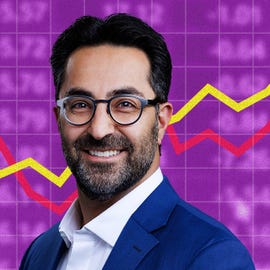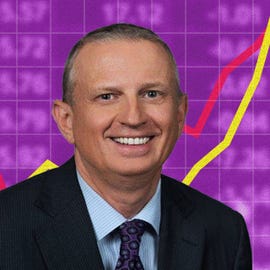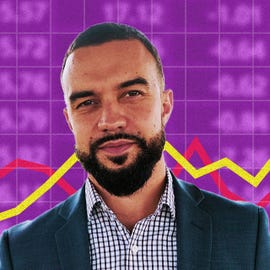Investors were left spinning again this week as the stock market dropped into bear territory once more. Global uncertainty, high inflation and rate hikes have marked a dizzying year for the market.
Now we’re wondering: What comes next?
With inflation still uncomfortably high and another aggressive rate hike expected from the Federal Reserve next month, the market is likely in for a bumpy ride.
“Investors should brace themselves for more market volatility,” said Mahesh Odhrani, certified financial planner and president of financial planning firm, Strategic Wealth Design.
The market’s short-term fate is contingent on multiple factors, so any predictions about what comes next are simply educated guesses. The Fed has raised interest rates five times this year in an effort to curb inflation. Now, a recession seems more likely than a “soft landing,” according to Federal Reserve Chair Jerome Powell. And though it’s impossible to say how deep that recession might be or how long it will last, such a downturn will definitely inflict more pain across the board, including an uptick in unemployment.
While experts indicate a light at the end of the tunnel, the market usually gets worse before it rebounds. Here’s what five experts said is likely to happen as 2022 comes to a draw and we brace for 2023.
Where experts predict the stock market is headed


Market uncertainty will persist.
“Investors and markets have underestimated inflation and the resiliency of the US economy until now. Market volatility is unlikely to change over the next six months.” — Mahesh Odhrani, financial planner and president of Strategic Wealth Design.


Brace for an official recession.
“The stock market will continue to be volatile in 2023. A recession in 2023 is very likely, which means the stock market is likely in for further declines.” — Doug Carey, chartered financial analyst and president of WealthTrace.


A guessing game, at best.
“Anybody who tells you they know what is going to happen, you probably should run as far as you can in the other direction.” — Sonja Breeding, CFP and vice president of investment advice at Rebalance.


‘Reasonable returns’ are possible next year.
“If inflation abates due to the aggressive actions by the Fed, I think we will witness reasonable returns in the stock market over the next year.” — Robert Johnson, professor of finance at Creighton University’s Heider College of Business and chairman/CEO of Economic Index Associates.


One stock market indicator bodes well.
We’re seeing that the P/E ratios are much more in line or actually below historical averages for most things, which bodes really well for the future.” — Kirill Semenov, CFP and wealth adviser at Intellicapital Advisors, LLC.
Expect continued volatility
If there’s one constant you can count on in the stock market right now, it’s volatility.
Don’t anticipate much change in market volatility over the next six months since the threats to economic growth remain the same — namely, the war in Ukraine, the energy crisis in Europe, global inflation and supply chain issues, among multiple climate disasters, said Odhrani.
And what happens with inflation will play a big role in changes in the market. For example, market volatility could taper off if inflation settles and the Fed starts to ease off its rate hikes, said Sonja Breeding, CFP and vice president of investment advice at Rebalance. But she also warned: “I don’t have a crystal ball. It’s pretty tough to tell.”
A recession through the summer of 2023 is likely, which means the stock market will experience further declines for a bit longer, said Doug Carey, chartered financial analyst and president of WealthTrace, a web-based financial and retirement planning software.
Although the US economy’s performance in the first half of 2022 fits the technical definition of a recession — two consecutive quarters of decline — an official recession has not yet been called. Still, the economy remains shaky, and that’s reflected in current market performance.
While experts can provide some predictions based on previous market trends, don’t rely too heavily on forecasts. “Anybody who tells you they know what is going to happen, you probably should run as far as you can in the other direction,” said Breeding.
Signs hint at a market recovery next year
It’s not all doom and gloom into 2023, however. Historically, after inflation starts to cool, the Fed begins lowering interest rates and the stock market begins to bounce back. “History shows that as soon as it is very clear the economy is in a recession, that is when the recovery begins,” said Carey.
“If inflation abates due to the aggressive actions by the Fed, I think we will witness reasonable returns in the stock market over the next year,” said Dr. Robert Johnson, CEO of Economic Index Associates. At the same time, Johnson noted that any unforeseen circumstances, like another wave in the pandemic or global conflict, can derail that.
Still, the latest data on price-earnings ratios have experts feeling optimistic. P/E ratios compare a stock’s current price with its latest earnings per share, and they tend to be pretty reliable indicators of where the market is headed. A high P/E ratio usually indicates a growth stock, though it could also mean a stock is overvalued.
“We’re seeing that the P/E ratios are much more in line or actually below historical averages for most things, which bodes really well for the future,” said Kirill Semenov, CFP at Intellicapital Advisors. “No indicator paints the entire picture, but tamer P/E’s are generally considered to be a better time to invest than buying into inflated valuations.”
Investment moves to make in a shaky market
Ups and downs are a regular part of investing. In this current climate, experts recommend long-term investments, which offer you a better chance of riding out the waves. And with markets down, investing now could mean scooping up stocks at a lower price.
According to experts, here are some tips for investing in the market.
Play it safe
Opting for lower-risk, long-term investments that are spread out across multiple companies or industries can help diversify your risk. Most investors should opt for an index fund rather than actively trading stocks, according to Johnson.
“Too many people believe that active trading is necessary to successfully build wealth,” said Johnson. “The best strategy for most investors is to simply invest in a broad index fund, either mutual funds or ETFs [exchange-traded funds], that tracks the performance of the market.”
Diversify your portfolio
Rather than putting all your eggs in one basket, try diversifying your investment portfolio, said Odhrani.
“Stay diversified within multiple asset classes and sectors,” he said. “They say in baseball that it’s all about the singles and doubles. Diversification is about hitting those singles and doubles versus trying to hit a home run. Diversification can smooth the ride over the long term, especially in volatile markets.”
Don’t let your money depreciate in savings accounts
Although some high-yield accounts have begun offering savings rates of 2% – 3%, most are still hovering close to 0%. “Leaving too much money in bank accounts or money market accounts that barely pay any interest can destroy savings,” said Carey.
While you should leave enough money in an easily accessible savings account to cover emergencies — between three to eight months’ of minimum expenses — any cash above this can be put to better use.
“If inflation is 7% each year and you have money in a bank account only earning 0.5%, nearly 40% of the value of this money is wiped out in terms of its purchasing power after 5 years,” Carey said.
Treasury bonds are one of the best ways to outpace inflation right now, according to Carey and Semenov. Treasury Inflation Protected Securities (TIPS), also known as bonds, and I bonds. another treasury-backed investment vehicle, both offer savings rates above 9% right now, which can help you hedge against inflation.
Hang on for the ride
When you see so many stocks in the red, you might be tempted to sell off your holdings. Avoid impulsive moves, recommended Odhrani.
“It is painful, and investors are nervous, but making rash decisions may hurt them,” he said. “We believe that the best thing investors can do in crazy times like these is to stay calm, invested, diversified, and focus on their long-term goals.”
Playing the long game, rather than jumping ship when stocks are down, may lead to higher returns in the end. “You never really know when the market will peak or valley,” Breeding said. So, investing a set amount regularly can help you average your purchase price overall, regardless of what’s happening in the market.
Ultimately, Breeding is hopeful that the US stock market will pull itself out of its slump.
“We’ve built our society on productivity and determination,” said Breeding. “I think that will continue into the future and bolster the economy as it has historically.”
Techyrack Website stock market day trading and youtube monetization and adsense Approval
Adsense Arbitrage website traffic Get Adsense Approval Google Adsense Earnings Traffic Arbitrage YouTube Monetization YouTube Monetization, Watchtime and Subscribers Ready Monetized Autoblog
from Stock Trading – My Blog https://ift.tt/FJgiARo
via IFTTT





